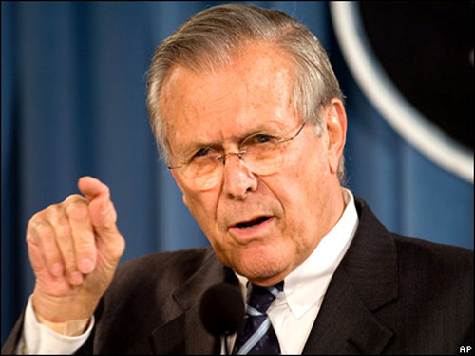
Former Secretary of Defense Donald Rumsfeld spoke to Breitbart News about the attack on the U.S. consulate in Benghazi, and the apparent cover-up that has followed as the administration struggled to spin the story.
Breitbart News: When you hear the word “Benghazi,” with all we know now, what comes to mind?
Rumsfeld: Well, the first thing that comes to mind is the loss of life: the four Americans, including the Ambassador, who were murdered, who were killed in a terrorist attack. They were killed in a terrorist attack that has been misrepresented by the most senior officials in our government. From the President to the Secretary of State to the Ambassador to the United Nations to the President’s spokesman, there has been a pattern of characterizing the attack as a spontaneous outbreak because of a “hateful video.”
It is heartbreaking that there were obvious warnings before this happened. There were warnings that the security was inadequate, and there were requests for better security that were not fulfilled. Our government knew it was September 11th, and the anniversary of the September 11th attacks of 2001, yet the warnings, apparently, were ignored.
And when the President characterizes the things that happened there as “bumps in the road,” it seems to me that doesn’t reflect a full understanding of his responsibilities.
Breitbart News: You speak of “responsibilities,” which leads me to ask about the President’s responsibilities regarding the distress call sent when Ambassador Stevens was in trouble. Is there any possible way that the President failed to receive or to see that distress call?
Rumsfeld: First, I guess you never want to say never. But the information flow into the Situation Room in the White House is massive. Basically, anything of significance that is known and forwarded to the State Department, the CIA, or the Department of Defense ends up available in the Situation Room in reasonably rapid manner. They have excellent communications capabilities.
Does it go directly to the Oval Office? No. It goes into the Situation Room where the Chief of Staff of the White House and the National Security Advisor end up being alerted to anything of significance. And certainly the risk of life for an Ambassador is something that would qualify as significant.
Therefore, we know that the Chief of Staff of the White House and the National Security Advisor were made aware of the threat that existed, of the danger that existed: of the immediate threat to Americans. Because that information, I have every confidence, ended up in the Situation Room very rapidly.
What the Chief of Staff of the White House and the National Security Advisor did with the information–how rapidly they told the President–I don’t know. If they did not tell the President or did not tell him in a timely manner, shame on them, and shame on the White House, and shame on the President for having people who don’t know what’s important.
If they did tell the President in a rapid manner, then he would have had the information.
He either had it or he should have had it, let me put it that way.

COMMENTS
Please let us know if you're having issues with commenting.